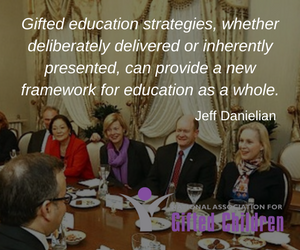NAGC works to support those who enhance the growth and development of gifted and talented children through education, advocacy, community building, and research
Like many of you, I am immersed in the field of gifted and talented education, both in my roles at NAGC and as the director of a secondary enrichment program in Providence, RI. I am often taken back by the impact Gifted Education research and practice has, and continues to have, on the field of general education. Several new conversations about the field’s importance has spurred me to share the following short piece with you, a spoof of Monty Python’s “What have the Romans ever done for us?” scene from the feature film Life of Brian.
Additionally, the change of leadership at the US Department of Education brings with it an unknown future for education, but one that I hope will embrace what our field has to offer. And, I figured readers would appreciate a bit of educational humor. Even if you are not familiar with the movie scene, I believe you will enjoy this look at how education overall has improved because of gifted education research and practice.
Picture This:
Scene 1: The year, 2017. The place, a meeting room in the halls of Congress.
On the eve of a vote which includes a request for a funding level of $20 million for the Jacob Javits Gifted and Talented Education Program, a few senators sit drinking their coffee while discussing the ramifications of the vote.
SENATOR 1: Yeah. All right, Senator. Don't labor the point. But .03 cents of every dollar spent on education focused on an program with little impact is simply too much to ask. Tell me, what has gifted education ever given to general education?!

SENATOR 2: Differentiation.
SENATOR 1: What?
SENATOR 2: Differentiation, you know, modification of curriculum for students.
SENATOR 1: Oh. Yeah, yeah. They did give us that. Uh, that's true. Yeah.
SENATOR 3: And grouping.
SENATOR 5: Oh, yeah, grouping, SENATOR 1. Remember what classrooms used to be like before cluster, skill, interest, and ability grouping?
SENATOR 1: Yeah. All right. All right. I'll grant you that grouping and differentiation are two things that gifted education research has done for all students. But…
SENATOR 4: (Interrupting) And acceleration.
SENATOR 1: Well, yeah. Obviously acceleration. I mean, acceleration goes without saying, right? But apart from grouping, differentiation, and acceleration--
SENATOR 6: Creativity training.
SENATOR 9: Curriculum Compacting.
SENATORS: Huh? Heh? Huh...
SENATOR 8: Early entrance to college and credit for college classes.
SENATORS: Ohh...
SENATOR 1: Yeah, yeah. All right. Fair enough.
SENATOR 9: And math and science academies, allowing our nation to remain globally competitive.
SENATORS: Oh, yes. Yeah...
SENATOR 7: Yeah. Yeah, that's something we'd really miss, SENATOR 1, if we didn’t support gifted education research. Huh.
SENATOR 6: Oh, and special enrichment programs.
SENATOR 5: And infusing social and emotional awareness and education in classes, SENATOR 1.
SENATOR 7: Yeah, some educators certainly know how to increase self-efficacy and autonomous learning. Some kids love going to school now and more would if teachers were trained in these gifted education strategies.
SENATOR 1: All right, but apart from grouping, differentiation, acceleration, curriculum compacting, creativity training, early entrance to college, college credit, math and science academies, special enrichment programs, and a focus on social and emotional development, what has gifted education ever done for education?
SENATOR 2: Helped identify advanced students from underserved and low socio-economic backgrounds who would have remained hidden, giving them a chance to fully develop their talents, too.
SENATOR 1: Oh… Be quiet!
With all of the problems plaguing our nations’ educational system, I suggest that gifted education strategies, whether deliberately delivered or inherently presented, can provide a new framework for education as a whole. Perhaps if more general education leaders recognized that many of the innovative strategies they seek to provide to students were actually developed in the field of gifted and talented education, they would look to “us” for the answers they seek.
For more information about the research associated with the Jacob Javits Gifted and Talented Education Program, please click here. You can also learn more about former and current research funded by the program at the National Center for Research on Gifted Education.